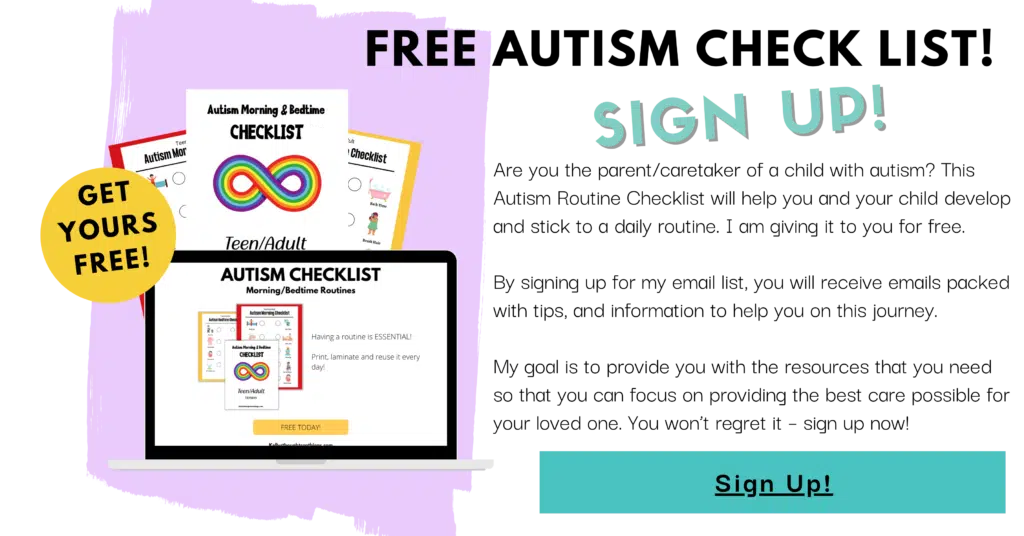When you receive an autism diagnosis for your child, it can feel like a death. The grief you experience is very real and valid. You may feel like you are grieving the loss of the life you imagined for your child. There are many ways to cope with this grief and get through it.

It’s hard to describe the despair and Grief that overwhelms you as a parent when you discover your child has been diagnosed on the autism spectrum.
You have many questions about why this happened and where to start. This is common.
There are ways that you can do to get through it, though, and put yourself in a better place for the future.
These are some ideas I will share with you from dealing with an autism diagnosis that I wish someone had shared with you before you started our journey on this new path.
Here are ten ways to deal with grief after being diagnosed with autism:
Instagram is an amazing place to be! We’re always on there sharing our everyday adventures with you. Join us on Instagram as we share our travels, recipes, and crafts! Be sure to check out the stories for real-time fun.
Take time for yourself
The first step in coping with Grief after an autism diagnosis is taking time for yourself.
It’s simple for parents to fall into the trap of self-sacrifice when raising a child with special needs — especially if they have other medical conditions.
But children need their parents more than ever at this point in their lives because they will depend on them for emotional support as well as practical help like diaper changing, feeding, and bathing.
You should take care of yourself first so that you can be there for your family.
Take some time away from your child, if possible, and give yourself time to process your emotions and adjust to the new reality.
You may want to seek counseling or talk with friends about what you’re experiencing.

Find or Seek support from your friends, family, and community.
Seek someone who understands what you’re going through right now, whether it’s a friend or family member who has gone through this before as well or someone who wants to listen to what you want to say without making any judgments about your situation at all (like a therapist).
This person will be able to help you out when things get too hard for you to handle on your own anymore and believe me when I say they will get harder before they get easier.
Find a purpose in the journey ahead
Accept that you can’t change the past or your child’s condition now. But you can change what happens next by helping him get through this difficult time with support from doctors and other professionals specializing in autism spectrum disorders (ASDs).
Your child will likely need ongoing therapy over many years as he learns more about his condition and how to manage it successfully.
Learn everything you can about ASDs before starting treatment
It’s essential to learn all you can about ASDs so that you know what kind of treatment options are available for your child.
You’ll also want to know what treatments have worked well for other people with ASDs so that you can help your child.

Find help from others who understand
Look into local resources such as support groups and online communities where you can connect with other parents who have children/s with ASD or similar disorders like ADHD or OCD.
Find help from others who understand what you’re going through.
Your feelings are valid, and many other people out there have experienced similar things.
Find someone who will listen to you, be supportive and allow you to cry when needed.
Accept that your life is different now, but it doesn’t mean it has to be negative forever.
There are still many things that can be done for your child, even if they have significant challenges, so don’t give up hope yet!
Sign Up Below For Your Free Autism Check List!
Take care of yourself physically as well as emotionally and mentally
One way is to take care of yourself physically as well as emotionally and mentally.
Ensure that you’re eating healthy and getting enough sleep; this will help you manage stress better.
If possible, go out with friends or family members so that you have someone who can listen to your problems without judgment or criticism.
It’s also important to talk about your feelings with other parents who’ve gone through this same experience; they’ll understand what you’re going through because they’ve been there themselves too!

Keep things in perspective
Focus on the strengths of your family and child.
You are coping with Grief after an autism diagnosis to keep things in perspective.
It would be great to remind yourself that your child is still the same person he was before the diagnosis.
He may have some struggles now, but he will still grow up and become an adult who can lead a happy life.
Remember that others grieve too
If your child was just diagnosed with Autism, then the chances are good that you’re not alone in your feelings of loss.
A lot of parents of children with special needs experience Grief when they receive an autism diagnosis, even those who have been through it before.
The important thing is to remember that others will also be going through this difficult time alongside you.
Share your feelings with other parents who’ve experienced similar diagnoses.
One way to cope with Grief after an autism diagnosis is by connecting with other parents whose children have special needs or disabilities like yours does.
You may be surprised by how many people out there share your feelings of fear and uncertainty about what lies ahead for their children and families and their feelings of loss at having “lost” what might have been for their child.

Educate yourself about Autism by reading books or going to websites designed for parents and families dealing with autism spectrum disorder (ASD)
There are a lot of resources available to help with this process. You may even want to contact your local chapter of Autism Speaks or another organization that supports individuals on the spectrum.
These groups can provide and help you with valuable information about the latest studies, therapies, and treatments available for those living with ASD.
The Internet is a fantastic tool for this as there are many websites dedicated to helping parents understand autism spectrum disorder (ASD). There are also books written by experts in the field that can be very helpful.
Let go of guilt over past decisions regarding treatment options or feelings about the disability itself
Parents may feel as though they failed their child by not doing enough to prevent the condition or that they should have done more to help their child overcome problems.
Parents need to understand that grieving is a normal part of dealing with an autism diagnosis.
In fact, studies show that parents who are able to cope with their Grief are better able to provide support for their children and help them lead fulfilling lives.
However, you should not be stuck with guilt and what-ifs.
While there’s no way to know whether or not your child would have been diagnosed with Autism if you’d pursued specific treatments or therapies earlier in life, it’s best to try and focus on what you’re doing now instead of what might have been.

Remember that there is always hope for the future.
When a diagnosis like Autism comes in, it can be challenging to accept and cope with the news at first.
But remember that there are many incredible advances in science today that can help people with Autism live better lives than before.
Don’t let yourself get overwhelmed by the diagnosis. Our child still has so much potential, and it’s up to you as parents to help them reach their full potential.
There’s no reason why your child shouldn’t achieve their dreams and goals in life if they have enough support from family members and loved ones.
For example, there are now many treatments available for individuals with Autism that can help them improve the quality of their life and make everyday experiences better than they were before they got diagnosed with this condition.
There are also discoveries every day about what causes Autism and how we can treat it, so don’t give up hope just yet!
The late Dr. Bernard Rimland, founder and director of the Autism Research Institute, once said: “Grief is evoked by any loss – the death of a loved one, the end of a marriage or job, the loss of health or childhood. Grief comes from our sense of loss.”
Are you on Facebook? I am too! Join me as I share everyday adventures with you. I will be sharing our travels, recipes, and crafts!
It can take time to heal, even under ideal circumstances. Coping with Grief after an autism diagnosis may seem insurmountable at times.
If you have reached this point, we commend your courage and dedication.
I hope that this guide was able to provide a helpful outline of your next steps.
What matters is how you first made it through the worst day of your life and how we are here to help you make it through day two.
